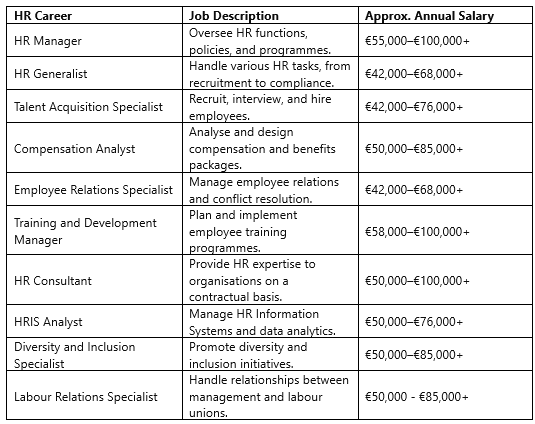
How a Degree in Human Resources Can Boost Your Career: A Guide for Aspiring Professionals
A degree in human resource management can open doors to various career opportunities in human resources. Whether you’re an experienced professional or considering beginning a journey into the world of HR, a degree can set you up on the best path possible to succeed and progress quickly in your career.
Being aware of the diverse career options and the range of specialities that are available in HR can help you make a decision that best suits you when it comes to your education. This blog post will explore the industry and how it has evolved over recent years, as well as the skills you will learn and the career paths available to you after studying for an HR degree.
What is Human Resource Management?
Human resources (HR) refers to the department within an organisation that is responsible for managing personnel-related functions and activities. The department ensures that employees’ performance is optimum and safeguards their well-being within the workplace. There are many vital responsibilities the HR department handles, some of which are listed below:
- Recruitment and staffing
- Handling employee relations
- Training and development
- Compensation and benefits
- Performance management
- Legal compliance
- Diversity and inclusion
- Health and safety
- Employee engagement
HR professionals are crucial when it comes to the success and growth of a company. They must hold a variety of skills and stay organised among the many specialities and responsibilities the department has to manage, such as HR management, HR development, compensation and benefits.
The scope of human resources management is extensive, touching every part of the employee life cycle from recruitment to exit interviews. Understanding this broad scope is essential for those aspiring to thrive in this ever-changing field.
How the World of Human Resources is Evolving
The integration of technology has had a significant effect on businesses today, and human resources departments have had their fair share of changes. Automation and AI have significantly impacted how candidates apply for jobs and how employees are recruited. Algorithms play a significant role in screening candidates, and chatbots now handle routine employee enquiries.
Data analytics also plays a pivotal role, enabling HR professionals to make data-driven decisions about talent management, employee engagement, and overall organisational effectiveness.
The pandemic has also impacted HR, inviting a widespread adoption of remote work and flexible work arrangements. This has led HR departments to reevaluate policies and practices to accommodate employees working from home or on hybrid schedules.
Maintaining employee engagement, addressing well-being concerns in remote settings, and creating a sense of connection and collaboration among dispersed teams are just some of the responsibilities HR professionals must now manage on a regular basis.
Benefits of Pursuing an HR Degree
Studying human resources can offer a range of benefits, both in terms of personal and professional development. Here are some key advantages to pursuing a degree or certification in HR:
- Diverse Career Opportunities
A degree in HR opens up diverse career paths within various industries. HR professionals are needed in organisations of all sizes and across sectors, providing a broad range of career opportunities.
- Strategic Role in Organisations
HR professionals play a strategic role in shaping organisational success. They contribute to talent management, employee engagement, and overall organisational effectiveness, making a tangible impact on an organisation’s performance.
- In-demand Skills
An education can aid human resource development by equipping students with in-demand skills such as communication, negotiation, conflict resolution, and strategic thinking. These skills are transferable and valuable in various professional contexts.
- Adaptability to Changing Work Environments
The study of HR prepares individuals to navigate dynamic work environments, including trends such as remote work, diversity and inclusion, and technological advancements. HR professionals are essential in helping organisations adapt to change.
- Influence on Workplace Culture
HR professionals have a significant role in shaping workplace culture. Studying HR provides insights into creating inclusive, positive, and productive work environments contributing to employee satisfaction and retention.
- Continuous Learning and Development
HR is a field that continually evolves to meet the demands of the modern workplace. Studying HR encourages a commitment to lifelong learning, ensuring professionals stay updated on industry trends and best practices.
What Skills Will I Develop While Studying for an HR Management Degree?
The role of an HR professional is a multi-faceted one which requires a variety of skills. A degree in HR is the best way to get a well-rounded opportunity to hone these skills to prepare for a successful career. Take a look at some of the skills you’ll learn from a degree that you will put into practice in your role.
- Communication: A degree can help you develop your written and verbal communication skills to facilitate positive interactions and manage tricky situations in the workplace.
- Interpersonal Skills: Build relationships, collaborate, and work effectively with individuals at all levels of an organisation.
- Problem-Solving: Studying can help hone your analytical skills and critical thinking to address complex HR challenges and make informed decisions.
- Conflict Resolution: Learn negotiation and conflict resolution techniques to manage workplace disputes and foster a positive organisational culture.
- Leadership and Management: Develop leadership capabilities and skills to guide and inspire teams, especially in talent management and employee development.
- Strategic Thinking: A degree will help you acquire the ability to think strategically, align HR practices with organisational goals and contribute to overall business success.
- Ethical Decision-Making: Ethical decision-making skills, arguably one of the most important, will help you understand the importance of fairness, equity, and compliance in HR practices.
Career Opportunities in HR
Every successful business relies on its HR management team to ensure the best decisions are made for the company. This means there are plenty of human resource management jobs looking for well-equipped individuals who can bring a wealth of knowledge and passion to the role.
Have a look at the table below of some HR careers available and their approximate annual salaries.

A degree in human resources will allow you to acquire a comprehensive skill set that goes beyond the confines of traditional personnel management. Whether your passion lies in talent acquisition, employee relations, or shaping the future through training and development, the world of human resources opens doors to meaningful and impactful careers. If you’re interested in studying for a human resources degree, the MSc Global Human Resources Management by the Berlin School of Business and Innovation (BSBI) is an outstanding programme designed to train future leaders and HR professionals to work at the intersection of business strategy and people management. The programme was developed by the University of Roehampton, known for its high-quality learning and research experience.